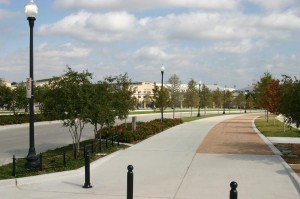Poke around in Fort Worth’s arts scene for very long, and you’ll notice names such as Bass, Richardson, Kimbell, and Carter keep popping up. Those surnames, along with others, belong to old-money families whose charity helped turn Fort Worth from a cowtown into a cultural mecca.
American cities have long enjoyed a tradition of prominent families supporting the arts, but these days that money isn’t as easy to come by. Even if succeeding generations continue a philanthropic tradition, the range of causes to be supported is much broader now, and the money may go to social or environmental groups. The economic impact of the World Trade Center bombing in 2001, followed by the 2007 recession, blurred the private-funding picture for what promises to be a long time. So arts organizations look toward their cities — meaning taxpayers — for help.
“That’s very much an across-the-country trend,” Ulich said.
In Fort Worth, the Bass family has always been a major backer of the arts.

“The Bass brothers have been huge supporters of the arts community, and we really appreciate their support,” Ulich said. “[Without them], the arts in Fort Worth wouldn’t be what they are today. They give and they change the face of Fort Worth for the better, which is a fabulous thing.”
But the Basses are also heavily tied in with the stock show, the push for the $15 million road paid for by taxpayers, and the parking situation that has many in the Cultural District grinding their teeth.
An arts lover who was interviewed for this story lamented that even Birmingham, Ala., which is far smaller in population than Fort Worth, gives more money to its arts organizations. That was true at one point, but Birmingham’s public funding of the arts has derailed in recent years. The Birmingham Metropolitan Arts Council was distributing about $2 million annually as far back as the 1980s. But funding became harder to get over the years as families gave less, corporations pulled back, and a recession settled in for a long stay. Jefferson County, where Birmingham is located, went broke in 2004 and filed for bankruptcy in 2011.
The city no longer has an arts council to disperse money. Individual arts organizations fend for themselves now.
“It’s a sign of the times,” said Cathy Gilmore, who was executive director of the arts council before it evolved into the Metropolitan Arts Center in Birmingham. “The remaining groups are very strong because they do their own fund-raising, but there is no central agency raising money for the arts anymore.”
As in Fort Worth, rich families helped establish the arts scene in Birmingham. Many years ago, five top business leaders came together and developed an arts council so that individual arts organizations wouldn’t continuously be clamoring for donations. The businessmen established an endowment and channeled its proceeds through the arts council, which split it up among local organizations.
By the 2000s, those men were gone.
“The older, moneyed families who would give lots of money –– their portfolios have changed, or they’ve passed away, and the children might not be as interested in the arts,” Gilmore said.
Banks and corporations began merging, meaning fewer potential sponsors to tap into. Throw in a recession, and the arts scene that had been so nurtured for so long in Birmingham found itself scrambling for support.
“We survived,” Gilmore said. “We have a very vibrant arts scene. It was survival of the fittest. If you had your act together and had good leadership, you could make it. Small groups that couldn’t hang on have gone away.”
Gilmore thought for a moment when told about Fort Worth’s arts council and its efforts to get funding from the city.
“Fort Worth should be happy” with $1.1 million, she said. “I wish we could get that.”
********
Rumors began flying after David DuBois stepped down from his job as president and CEO of the Fort Worth Convention & Visitors Bureau last year and was replaced with Bob Jameson, a longtime Bass ally. Was DuBois shoved out to make way for Jameson, who would ensure that Bass and his equestrian center would get the red carpet rolled out at the expense of everyone else, including the arts?
“That’s total crap,” DuBois said with a laugh. He said he resigned to accept a loftier position as president and CEO of the International Association of Exhibitions and Events, based in Plano.
He envisions the future Bass arena as a major boon for the Cultural District and for Fort Worth as a whole. He said the arena will work with the Fort Worth Convention Center to attract more events.
In his new position, DuBois talks frequently with people from around the world seeking arena space for events. Fort Worth often comes up short in that area, he said.
“A lot of shows don’t go to Fort Worth right now because the facilities are too small,” he said. “About 75 to 80 percent of exhibition trade shows cannot fit into the Fort Worth Convention Center.”
Beginning in 2010, Fort Worth bucked a trend by refusing to give hotel occupancy tax income to arts groups and instead started funneling the approximately $14 million in annual collections to the convention center and the Will Rogers Memorial Center. The convention center is landlocked by its downtown footprint and limited by how much it can expand. The city spent $75 million to update and expand the convention center about 10 years ago, but its arena space remains outdated, DuBois said.
The Bass arena could add as much as 100,000 square feet of arena space and seating for 10,000 or more to the mix. There will be some competition between the two facilities, but more often than not they will complement each other, DuBois said.
The recent redevelopment of the Bass-funded Sundance Square, West 7th Street’s makeover into an entertainment district, and the anticipated equestrian center together will make central Fort Worth a unique and cohesive destination place, he said. “Progress is not easy,” DuBois said. “Do you think Sundance Square would be what it is today if there weren’t risk-takers like the Bass family?”
A new Bass arena would spur an increase in shows and tourism and no doubt prompt the construction of a new hotel or two, he said.
Arts organizations attract their fair share of tourists as well. Finding money to fund the arts and the convention centers isn’t easy, but Fort Worth figured out a way to do it, and in the end, everyone will benefit, DuBois said.
“It’s not the stock show against the museums,” he said.
Still, an us-against-them mentality can arise when arts groups grow suspicious about whether secret negotiations are occurring among city officials, politicians, and Event Facilities, the Ed Bass-led nonprofit group that is planning the arena. Little information has been shared publicly about the planned arena’s design, cost, funding, or exact location. The group’s bankroll has steadily increased from about $5 million in grants and contributions a few years ago to about $80 million in 2012, according to Event Facilities’ most recently filed Form 990.
And some grow nervous when they hear of things such as State Rep. Charlie Geren’s bill filed in 2011 to change state law to allow Fort Worth to bump its hotel tax from the state-approved 15 percent to 18 percent, with the extra money going exclusively to a venue designed for “rodeos, livestock shows, equestrian events, agricultural expositions, county fairs, or similar events” — in other words, Bass’ new arena.
Geren yanked the bill after the hotel industry caught wind of it and raised a ruckus. Geren, along with State Sen. Jane Nelson, filed revised versions of the bill in 2013 that didn’t increase hotel tax rates but funneled certain revenues to “enhance and upgrade convention center facilities, multipurpose arenas, multi-use facilities, and related infrastructure.” Bass’ proposed horse arena would fit that description. Hotels benefitting from the facilities would generate the additional taxes.
Julie Faver-Dylla, executive director of the Hotel Association of Tarant County, had warned that the 2011 version of the bill would negatively impact Fort Worth’s tourism because hotel taxes would be so high. The 2013 version of the bill, which became law on Sept. 1, is “a win-win situation,” Faver-Dylla said this week.
A local developer who asked not to be named said Event Facilities paid David M. Schwarz to design the arena. Schwarz has worked on other Bass projects, including Bass Performance Hall. The state-of-the-art horse arena’s cost is expected to approach $200 million, and Bass will probably expect the city to contribute a healthy portion, possibly through a bond package.
“The last I heard, the arena has been designed, and it’s ready to go,” the developer said. “It’s another piece to a wonderful puzzle.”
Ulich understands that the area is evolving, the puzzle pieces slowly coming together, with something special, she hopes, waiting at the end. “They are planning for the future, and they want this to be a place where people from all over the country and the world will come to,” she said.
When the stock show isn’t happening, the parking lots do sit empty for much of the time. But that is expected to change once the Bass arena is built and has begun attracting more events.
Even today, space limitations are a problem for equestrian events. A Granbury resident described driving to Fort Worth on a weekend in September to watch a horse show at the Will Rogers complex. The parking lots were packed, and no more seats were available inside the auditorium. He turned around and drove back home.
Trail Drive and the new parking spaces were built to accommodate horse events, but they also enlarge the Cultural District’s footprint as a whole. Some Cultural District patrons are excited that the Fort Worth Botanic Garden, which has always been physically separated from the museums by Harley Street and a foundry, is now connected and part of the mix.
The owner of Z’s Café was bitter after having his business killed by a paid parking lot that seemed to benefit only the stock show. Now Capua sees things in a somewhat different light.
“It’s easy to judge right now on [the basis of] what’s been happening in the past one or two years, but as a city we are growing rapidly, and if want to remain competitive, there is a big picture,” he said. “Looking long term for the next generation, it’s exciting to think about what could be.”











The Bass family is ruthless when it comes to putting pressure on the City. They manipulate and crush anything that gets in their way. Bob Bass is the worst, the other brothers fall in line.
Give me a call and tell me more (you can be a confidential source).
jeff — 817-321-9709
What “big” events are going to be at this arena? Compared to Dallas, Fort Worth doesn’t get many “big” events. I doubt if this will change that.
You all act suprised. When the Bass boys say “Jump!” Fort Worth & Tarrant county public employees, elected & appointed officials who know which side their bread is buttered on better say “How high!?!”
The real question is how much of this public money the Bass boys were able to skim into their pockets via front & shell companies they control, etc.
Shhhh. The Basstapo might be listening.
Fort Worth is run by a bunch of Bass.
Holes.
My thought’s about the Bass Family are very different from the previously posted comments. I am grateful that the Bass Family take the time and have the foresight to build Fort Worth into a model city and help push our economy during challenging times.
Good reporting, Jeff.